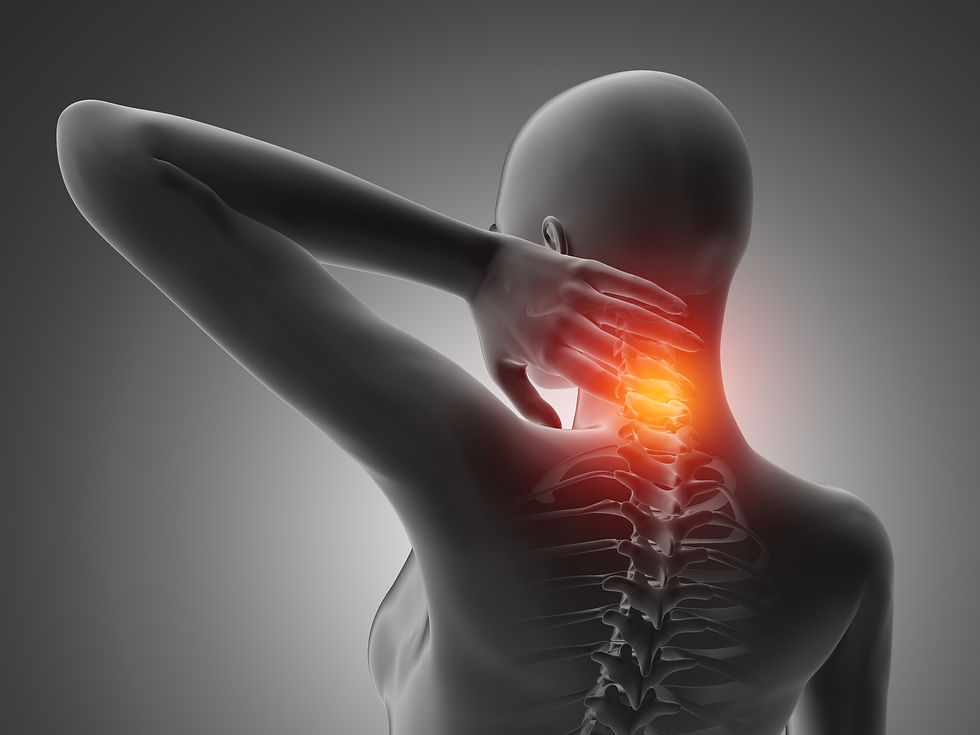The Relationship Between Spine Health and Illness
- 琇之 羅
- Aug 3, 2024
- 3 min read

The spine, a crucial component of the human skeletal system, is more than just a structural support for the body. It houses and protects the spinal cord, a vital part of the central nervous system that connects the brain to the rest of the body. Given its integral role, spine health significantly impacts overall well-being, influencing various bodily functions and potentially contributing to numerous health issues when compromised. Understanding this relationship is essential for maintaining optimal health and preventing a range of illnesses.
The Spine's Structure and Function
The spine consists of 33 vertebrae divided into five regions: cervical, thoracic, lumbar, sacral, and coccygeal. These vertebrae are interconnected by intervertebral discs and supported by muscles and ligaments, providing both stability and flexibility. The spinal cord runs through the vertebral column, transmitting nerve signals between the brain and body, thus controlling movement, sensation, and various autonomic functions.
Common Spine-Related Illnesses
Back Pain and Musculoskeletal Disorders One of the most direct consequences of poor spine health is back pain, affecting millions worldwide. Conditions such as herniated discs, spinal stenosis, and degenerative disc disease can result in chronic pain, reduced mobility, and disability. Poor posture, sedentary lifestyles, and improper lifting techniques are common contributors to these issues.
Neurological Disorders The spine's close relationship with the nervous system means that spinal problems can lead to significant neurological disorders. For instance, spinal cord injuries can result in partial or complete paralysis, depending on the injury's location and severity. Conditions like sciatica, caused by compression of the sciatic nerve, lead to pain radiating from the lower back down to the legs.
Cardiovascular and Respiratory Issues Poor spine alignment can also impact cardiovascular and respiratory health. Kyphosis, an excessive curvature of the thoracic spine, can reduce lung capacity and impair breathing. Furthermore, misalignment in the cervical spine can affect blood flow to the brain, potentially increasing the risk of strokes and other cardiovascular issues.
Digestive Problems The spine's alignment can influence the digestive system. Thoracic spine misalignment may compress nerves that control stomach and intestinal functions, leading to issues such as acid reflux, constipation, and bloating. Maintaining proper spine health can thus contribute to better digestive health.
Mental Health and Well-being Chronic pain and discomfort from spine-related issues can significantly impact mental health. Conditions like depression and anxiety are commonly associated with chronic back pain. Moreover, the stress of living with persistent pain can lead to sleep disturbances, further exacerbating mental health problems.
Maintaining Spine Health
Ergonomics and Posture Proper ergonomics and posture are crucial for spine health. Using ergonomic furniture, maintaining a neutral spine position while sitting, standing, and sleeping, and avoiding prolonged periods of sitting can prevent many spine-related issues. Regular breaks and stretching exercises during long periods of sitting can also be beneficial.
Physical Activity Regular physical activity strengthens the muscles supporting the spine, improves flexibility, and promotes better posture. Core-strengthening exercises, in particular, are essential for maintaining spine stability. Activities like yoga and pilates can also enhance spine health by promoting flexibility and alignment.
Healthy Weight Maintaining a healthy weight reduces stress on the spine and intervertebral discs, preventing conditions like herniated discs and degenerative disc disease. A balanced diet rich in nutrients, including calcium and vitamin D, supports bone health and reduces the risk of osteoporosis, a condition that can lead to spinal fractures.
Professional Care Regular check-ups with healthcare professionals, including chiropractors, physiotherapists, and orthopedic specialists, can help identify and address spine-related issues early. These professionals can provide personalized advice, treatments, and interventions to maintain or restore spine health.
Conclusion
The spine's health is intricately linked to overall well-being, influencing various bodily functions and potentially leading to numerous health issues when compromised. By understanding this relationship and taking proactive measures to maintain spine health through proper ergonomics, regular physical activity, a healthy diet, and professional care, individuals can significantly improve their quality of life and prevent many spine-related illnesses. Prioritizing spine health is not just about avoiding back pain; it's about ensuring the optimal functioning of the entire body.



Comments